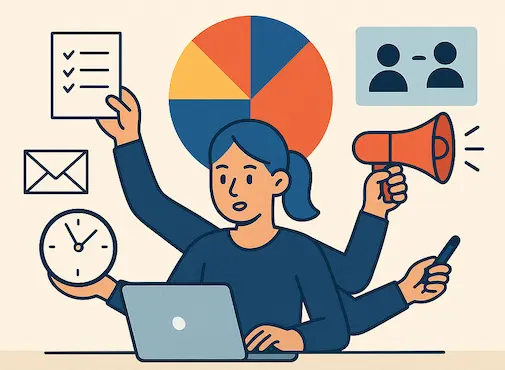I have done a bunch of experiments with not-for-profit initiatives over the past many years including hosting ADCx India, contributing to the main Audio Developer Conference (ADC), Game Audio India, Music Tech Community, teaching Wwise to new learners as free classes, hosting meet ups and more.
I get asked all the time how I'm able to do all of these, and I must mention here clearly that while it might appear fun & seamless, it definitely is not. There are many moments where a small step feels like moving a mountain, and that's when these lessons help.

Here are 5 observations for anyone who's genuinely keen on contributing to growing their industries & ecosystems (skip this post if your agenda is to get famous or build an image or create an audience for your commercial services – I don't endorse such tactic-style of luring people towards one’s business, so the philosophies mentioned below wouldn't suit your mindset):
- It will take up a major chunk of your resting time, so make sure you pick up something that "feels" like resting to you: Assuming that you'd spend after-office hours / weekends for these, it's fair to also assume that you'd require at least 5 hours every week to be able to ideate and do anything properly. While this might seem like a small amount, it's a lot. Carving it smartly is key, or else it will overwhelm you. Happy to help you plan, if you're finding it difficult. I'm just a DM / comment away.
- At some point, you will have to delegate, and that's not going to be easy: Only a tiny population wants to contribute with the pure intention of giving back. Almost everyone else you meet will want something in favour and they'll assume you're getting something out of it too (even when you are not). It's important to be upfront about it and keep everyone involved know about what it really means to work for a not-for-profit initiative – it brings you no gain, except for the feeling of satisfaction, if you consider that as "profit".
In case you're wondering, I don't earn anything monetarily from any of the initiatives I run or contribute to. 0.
- The only selfish outcome is your mental health: You get to talk more confidently to your past self, to your conscience and answer proudly to questions like, "What would you suggest to the 5-year-younger version of you?" And of course, you get to meet amazing people and become more than yourself (this is a hook to More Than Myself. Coming soon)
- Relying on brand support / sponsorships will reduce you to becoming a broker. Beware: I've seen many initiatives that deceivingly appear to be a "helping" community and soon turn into a paywalled talent management business. And some that are slowly growing so that the founders can turn it into a business, already asking for sponsorship in the name of "active users" and "niche audience". If you're making a business, make a business. Don't fake it as a "doing for a cause" thing because then you're hurting the genuine efforts other people are making. And remember, events can be hosted online for free, meet ups can be conducted in a local restaurant with the BYOB concepts.
- Remember the vision: If you're aiming to really contribute and help, be wise to remind yourself about your vision you started with. Write it down right at the beginning if that helps. Maybe also mention it on your website. You will need it when things become overwhelming.
💡 Bonus: Define the success criteria, and be chill about it. Most people who start something assume everyone to immediately hop on. That'll never happen, but what can happen is that you take baby steps, steadily.
There's another secret ingredient that can help when you get burnt out or feel exhausted at any point, but let's keep that for some other time. 😉

